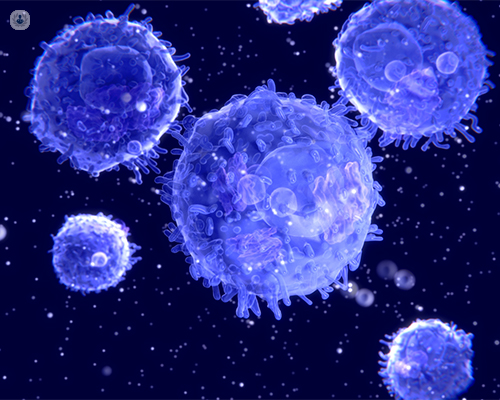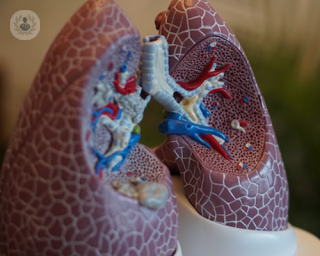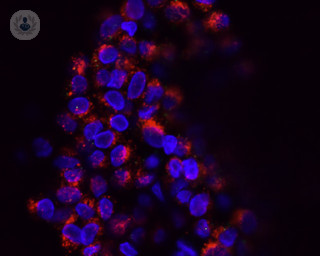What is immunotherapy?
Immunotherapy, also called biological therapy, biotherapy or biological response modifying therapy (BRM therapy), is a set of treatment techniques that boost the body’s natural defences-the immune system to fight cancer and certain infections. Some immunotherapy treatments boost the immune system overall, while others try to teach it to attack specific types of cells found in tumours. Treatments include the administration of vaccines, creams, tablets and the use of monoclonal antibodies (these are a type of protein that can attach to cancer cells in the body).

What is immunotherapy used for?
Immunotherapy is used to strengthen the immune system to help it fight cancer and side effects of cancer treatments. It can also be used to combat allergies. Allergy shots, also known as subcutaneous immunotherapy can alter the immune system and prevent the development of new allergies.
What does immunotherapy involve?
Treatment uses substances produced by living organisms or substances made in a laboratory. It can be administered in several ways:
- Intravenous (IV): An injection is administered directly into a vein.
- Oral: in capsule or tablet form to ingest.
- Topical: Application of a cream on the skin to fight cancer in its initial stages.
- Intravesical: This is an injection administered directly into the bladder to help tackle bladder cancer.
How long does treatment last?
This can depend on a number of factors, including:
- The type of cancer and how advanced it is.
- The type of immunotherapy taken.
- How the patient reacts to the treatment.
01-16-2013 12-22-2024
Immunotherapy
Professor Hendrik Tobias Arkenau - Medical oncology
Created on: 01-16-2013
Updated on: 12-22-2024
Edited by: Conor Dunworth
What is immunotherapy?
Immunotherapy, also called biological therapy, biotherapy or biological response modifying therapy (BRM therapy), is a set of treatment techniques that boost the body’s natural defences-the immune system to fight cancer and certain infections. Some immunotherapy treatments boost the immune system overall, while others try to teach it to attack specific types of cells found in tumours. Treatments include the administration of vaccines, creams, tablets and the use of monoclonal antibodies (these are a type of protein that can attach to cancer cells in the body).

What is immunotherapy used for?
Immunotherapy is used to strengthen the immune system to help it fight cancer and side effects of cancer treatments. It can also be used to combat allergies. Allergy shots, also known as subcutaneous immunotherapy can alter the immune system and prevent the development of new allergies.
What does immunotherapy involve?
Treatment uses substances produced by living organisms or substances made in a laboratory. It can be administered in several ways:
- Intravenous (IV): An injection is administered directly into a vein.
- Oral: in capsule or tablet form to ingest.
- Topical: Application of a cream on the skin to fight cancer in its initial stages.
- Intravesical: This is an injection administered directly into the bladder to help tackle bladder cancer.
How long does treatment last?
This can depend on a number of factors, including:
- The type of cancer and how advanced it is.
- The type of immunotherapy taken.
- How the patient reacts to the treatment.


Immunotherapy treatment for cancer: How does it work?
By Dr Omar Khan
2024-12-26
Immunotherapy treatment may be offered in many cases where patients receive a cancer diagnosis. In some cases, patients may also be able to participate in clinical trials should they wish to do so. Renowned consultant medical oncologist, Dr Omar Khan, gives expert advice for those considering taking part in a clinical trial, as well as specialist insight on how immunotherapy treatment works to fight cancer. See more


Ask an expert: How are different types of lung cancer treated?
By Dr Jay Naik
2024-12-26
We invited highly respected consultant medical oncologist Dr Jay Naik to share his expertise on the different types of lung cancer and the various approaches to treatment that may be employed in this informative article. See more


Systemic anti-cancer therapy: An expert guide
By Professor Andrew Wardley
2024-12-26
Leading consultant medical oncologist Professor Andrew Wardley explains what systemic anti-cancer therapy entails and how it can be used in the treatment of breast cancer in this informative article. See more


An expert guide to non-Hodgkin's lymphoma
By Dr David Wrench
2024-12-25
Learning more about lymphomas, especially the different types and how they affect you, in order to gain an understanding of the condition can provide a sense of control and positivity after a diagnosis. Here to highlight the difference between non-Hodgkin's lymphoma and Hodgkin's lymphoma is leading consultant haematologist Dr David Wrench. See more
Experts in Immunotherapy
-
Dr Mark Tuthill
Medical oncologyExpert in:
- Immunotherapy
- Breast cancer
- Prostate cancer
- Kidney cancer
- Bladder cancer
- Metastasis
-
Professor Helen Brough
Paediatric allergy & immunologyExpert in:
- Food allergies
- Respiratory allergies
- Immunotherapy
- Allergic rhinitis
- Eczema
-
Professor Gideon Lack
Paediatric allergy & immunologyExpert in:
- Asthma in children
- Allergic reactions
- Anaphylaxis
- Immunotherapy
- Food allergies
- Hay fever
-
Dr Saifee Abbas Mullamitha
Medical oncologyExpert in:
- Colorectal cancer
- Bowel cancer
- Liver cancer
- Immunotherapy
- Clinical trials
- Personalised medicine
-
Dr Omar Khan
Medical oncologyExpert in:
- Lung cancer
- Bladder cancer
- Prostate cancer
- Kidney cancer
- Immunotherapy
- Mesothelioma
- See all

The Portland Hospital - part of HCA Healthcare
The Portland Hospital - part of HCA Healthcare
205 - 209 Great Portland St. W1W 5AH
No existe teléfono en el centro.
By using the telephone number provided by TOP DOCTORS, you automatically agree to let us use your phone number for statistical and commercial purposes. For further information, read our Privacy Policy
Top Doctors

London Medical
London Medical
49 Marylebone High Street, W1U 5HJ
No existe teléfono en el centro.
By using the telephone number provided by TOP DOCTORS, you automatically agree to let us use your phone number for statistical and commercial purposes. For further information, read our Privacy Policy
Top Doctors

Bath Clinic - part of Circle Health Group
Bath Clinic - part of Circle Health Group
Claverton Down Road, Combe Down, Bath BA2 7BR
No existe teléfono en el centro.
By using the telephone number provided by TOP DOCTORS, you automatically agree to let us use your phone number for statistical and commercial purposes. For further information, read our Privacy Policy
Top Doctors
-
The Portland Hospital - part of HCA Healthcare
205 - 209 Great Portland St. W1W 5AH, Central LondonExpert in:
- Neurological spinal surgery
- Orthopaedic spinal surgery
- Maternity care
- Pregnancy
- Scoliosis
- In vitro fertilisation (IVF)
-
London Medical
49 Marylebone High Street, W1U 5HJ, Central LondonExpert in:
- Cardiology
- Adult Diabetes
- Child Diabetes
- Endocrinology
- General practice
- Ophthalmology
-
Bath Clinic - part of Circle Health Group
Claverton Down Road, Combe Down, Bath BA2 7BR, BathExpert in:
- Clinical analysis
- Cancer
- Breast Cancer
- Prostate Cancer
- Cardiology
- Cataracts
- See all
- Most viewed diseases, medical tests, and treatments
- Child nutrition
- CAR-T cells
- Hormone therapy
- Migraine
- Hodgkin's lymphoma
- Paediatric rheumatology
- Autoimmune diseases
- Joint pain
- Nutrition
- Genetic testing








